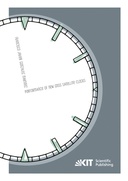Explore

Performance of new GNSS satellite clocks
0 Ungluers have
Faved this Work
Login to Fave
In Global Navigation Satellite Systems (GNSS), the on-board clocks are a key component from which timing and navigation signals are generated. This thesis reviews the performance of the first Passive Hydrogen Maser (PHM) launched by the Galileo system in 2008; and demonstrates how the new PHM can be consider as the best clock in space, pushing the physical clock error contribution below the noise floor of geodetic time transfer capabilities. Furthermore, overall GNSS clock peformance is reviewed
This book is included in DOAB.
Why read this book? Have your say.
You must be logged in to comment.
Rights Information
Are you the author or publisher of this work? If so, you can claim it as yours by registering as an Unglue.it rights holder.Downloads
This work has been downloaded 54 times via unglue.it ebook links.
- 54 - pdf (CC BY-SA) at Unglue.it.
Keywords
- Atomic Clocks
- clock performance
- GNSS
- Satellite Navigation
- Time prediction
Links
DOI: 10.5445/KSP/1000036610Editions

